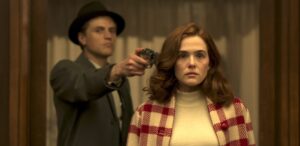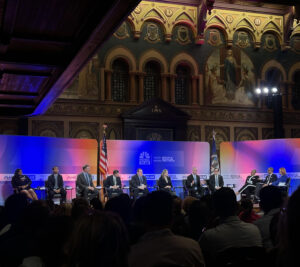As the 2020 election draws closer, ads humanizing wealthy politicians start to fill television screens once more. Inboxes are cluttered with donation requests, and campaign speeches hitting just the right number of buzzwords prey on the biases of their target audience with increasing frequency. Irresistible (2020), directed by Jon Stewart, tells us that our political system is only out to increase the money and power of those already in charge. Leaders should be looking to the needs of their people rather than to their own agendas—an important, grounding message during the frenzy of a normal election year. But during 2020’s election cycle, this isn’t what we need to be reminded of.
Irresistible follows the story of Gary Zimmer (Steve Carell), a political consultant for the Democratic Party, as he travels to the small town of Deerlaken, Wisconsin, in an attempt to elect party candidate Jack Hastings (Chris Cooper) to the mayorship of a Republican town. The campaign catches the eye of Gary’s nemesis, Faith Brewster (Rose Byrne), a political consultant for the Republican Party, who immediately pours money into the conservative incumbent’s campaign. What ensues is a media circus that no one from the town is particularly engaged in—the residents are used as puppets to further a fruitless rivalry between two eerily similar establishments.
Disillusionment with the political system is an unsurprising message for a film written and directed by Stewart, who has made his career by criticizing the ineptitude and hypocrisy of American politicians. Honestly, the movie feels like Stewart’s way of expressing his bottled-up thoughts on the state of politics since he retired from The Daily Show in 2015. The commentary on the alienation of ordinary Americans from the political system and the overinflated influence of money in campaigns is apt and necessary, but for a film that clearly thinks itself topical, it sorely misses the mark.
This, of course, is no one’s fault; the filmmakers could not have predicted the drastic turn our lives have taken since they started filming in 2019. However, the film’s narrative sequence banks on its message being apropos, as it subverts the typical storytelling structure to showcase how empty political rhetoric can be. Its premise cannot work if the commentary feels dated and out-of-touch with the current moment, and unfortunately, it does.
The film’s parody of conventional cinema is its real downfall. The climax of the movie intentionally does not deliver, and the political battle progresses forward aimlessly, linking jokes without a clear narrative. Hypothetically, the viewer is supposed to walk out of the film questioning if anything of substance happened; after all, this is reflective of our own government. But the attempt to formulate a movie whose sequencing sends a message about our political climate frankly just results in a boring, unsatisfying film—a collection of sketches, rather than a cohesive movie. A slew of clever one-liners cannot redeem a doomed premise.
All this to say, certain storytelling choices work exactly in the satirical measure they are meant to for this film. If the message is that political institutions are a spectacle and that politicians are out of touch with their constituents, the film’s stylistic choices encapsulate that perfectly. From the music to the setting, everything about the atmosphere the film creates is a picture of the most brutal stereotypes of a region, whether that be New York, rural Wisconsin, or Washington, D.C. When Gary arrives in Deerlaken, trading his freshly ironed suit for a flannel and oversized vest, the music playing in the background is reminiscent of what is heard walking down the streets of Frontierland in Disney World. When Gary and Jack fly to New York, jazz elevator music is heard beneath the drab conversations of wealthy white donors.
The shining moments of the film are those when Stewart allows his particular brand of political satire to come through. The Republican-esque gun-toting campaign ads meant to appeal to middle America voters are truly hilarious, and the movie’s middle stretch when Gary’s campaign team begins forming super PACs lands almost as well as a segment on The Daily Show. The speech where Jack rails against the very elite Gary is forcing him to solicit money from, only for his Democratic donors to eat it up and pad his pockets, marks the film’s most memorable commentary on political emptiness.
Still, many of the movie’s less inherently political bits stretch about five lines too long, ruining the moments where there could have been a genuine laugh. When Gary descends on Deerlaken, ordering a “burger and a Bud” to seem like one of the guys, the uppity D.C. political consultant cannot figure out how to open the bottle; the other men in the bar take notice, engaging in rather awkward dialogue about whether or not he needs help. Had this not gone on for over a minute, perhaps it would have been funny, but the sheer length of the scene ruins it. The film knows exactly where to cut the political jokes for maximum laughs; with the apolitical humor, it flounders.
More than any cycle in recent history, the outcome of this year’s election feels like life or death. As the coronavirus continues to close businesses, cancel schools, and endanger lives, and as the country engages in a nuanced and well overdue conversation about systemic racial injustice, the stakes of the political issues at hand are deeply personal. Reducing the emotional weight of these ballot issues by drowning them in discouraging, cynical political satire just doesn’t feel right in our current moment, and it simply drags down the movie-watching experience.
Perhaps the biggest problem with the film’s messaging is that it insists on demonizing the Republican and Democratic Parties equally, in a world where Republican leadership has failed our country’s citizens so deeply that a change in authority seems like the only way to restore any semblance of normalcy. What was meant to serve as a reminder of the flaws in a semi-typical election cycle just seems too simplistic for a country experiencing the uprooting of everything it knows. In 2019, Irresistible could have been introspective, if slow and sometimes pedantic. Today, it is preaching the wrong message from its soapbox.





